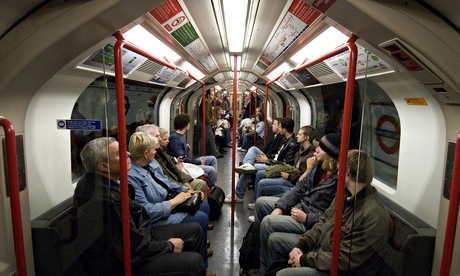
I recently learned of a surprising link between commuting by public transport and happiness.
I say surprising because I’m a Londoner who carries out my daily commute by bus and tube. I honestly thought I was the only one who liked it. Obviously up until this point I’d been going by the surly expressions of my fellow travellers. How helpful to now have evidence proving that those who travel to work by bus and train are happier than drivers.
You can’t ask people about their journey to work while they’re on it, after all. The closest I’ve come to talking to anyone on public transport in London this year was smiling at the three-year-old who pointed at my new jumpsuit one morning and shouted: “Why is that lady wearing a babygro, Mummy?” Not that I want to paint myself as some sort of attention-starved gargoyle, cheerfully gurning at my fellow passengers in a desperate attempt to engage them. Quite the reverse. Unless they are actually on fire I will not be making eye contact, and even if they were I’d try not to stare while speaking in low, apologetic tones, like Hugh Grant asking a girl out (sorry… I’m sorry… you appear to have… some flames… on you… there…).
No. Stoic, group silence is the only acceptable way to spend an hour in such intimate proximity to so very many strangers. It’s your journey to work, not a Robin Thicke video. But make no mistake: amid the silence, behind my blank expression, I am drinking deep and daily from a sustaining wellspring of joy. Yes, all the time – when the Victoria line is part suspended; when there’s a busker playing an unforgivable version of Fleetwood Mac’s “Albatross”; when the bloke opposite is inhaling an inexplicable 8am Pad Thai with all the expertise of a leaf blower, creating a vast arc of noodle backsplash and a pungent miasma that stretches the length of the entire carriage. Yes, then. Even when I can feel four distinct breaths on the back of my neck and can tell by the exhalation pattern that one of them is a dog’s.
It’s not just me. The University of East Anglia study surveyed 18,000 passengers and found that even when other factors that may affect wellbeing were taken out of the equation commuters who travelled to work on public transport were happier (that is, scored lower on feelings of worthlessness, unhappiness and sleeplessness) than those who drove. Key to it all is what public health experts call “active travel”. Drivers are choosing a “non-passive travel mode” requiring constant concentration. This can be boring, isolating and stressful. Active travellers, on the other hand, have time to relax. The simple walk to and from the station appears to have intrinsic value. As the UEA economist who led the study put it: “It appears to cheer people up.”
While we’re putting things simply, apparently the people who chose to take public transport were around half a stone lighter, too – the bodyweight benefits were found to be on a par with cycling. I don’t wish to do down the car, and perhaps I’m unusual in some ways – my commute is often the only hour in my day that is truly my own, which must go some way to making it special. If I had all day to read and listen to podcasts and radio programmes, perhaps I’d feel differently. But who has all day to do those things? Moreover, who wouldn’t feel better if they added half an hour or so of moderate exercise to their daily routine?
Perhaps the best idea is to take the lessons we learn by studying commuters and apply them to the weekend, when the pressure of the daily grind is off. As the poet Gwyn Thomas put it: “But the beauty is in the walking. We are betrayed by destinations.”
Follow Lauren on Twitter @LaurenLaverne

